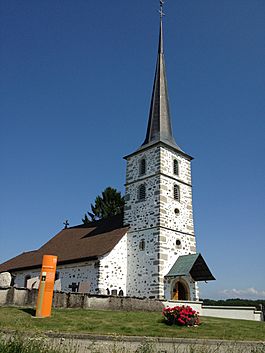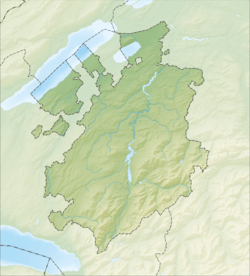Lully, Fribourg facts for kids
Quick facts for kids
Lully
|
||
|---|---|---|
 |
||
|
||
| Country | Switzerland | |
| Canton | Fribourg | |
| District | Broye | |
| Area | ||
| • Total | 5.5 km2 (2.1 sq mi) | |
| Elevation | 494 m (1,621 ft) | |
| Population
(Dec 2020 )
|
||
| • Total | 1,156 | |
| • Density | 210.2/km2 (544/sq mi) | |
| Postal code |
1470
|
|
| Surrounded by | Estavayer, Cheyres-Châbles, Les Montets | |
Lully is a small town, also called a municipality, located in the canton of Fribourg in Switzerland. It is part of the Broye district. On January 1, 2006, Lully grew bigger by joining with two nearby towns, Bollion and Seiry.
Contents
A Look at Lully's Past
Lully was first mentioned in old writings way back in the year 1011. Back then, it was known as in villa Lulliaco.
Where is Lully?
Lully covers an area of about 5.5 square kilometers (which is about 2.1 square miles).
How the Land is Used
Most of Lully's land, about 66.5%, is used for farming. This means fields for crops and pastures for animals. Forests cover about 20.4% of the area. The rest, about 12.5%, has buildings and roads. A very small part, 0.2%, is made up of rivers or lakes.
Most of the built-up areas are homes and other buildings. Roads and transportation take up a smaller part. In the forests, most trees are dense, while some areas have orchards or small groups of trees. For farming, a lot of land is used for growing crops. Some is for pastures, and a small part is for fruit trees or grapevines. All the water in Lully is from flowing rivers or streams.
Lully's Location
Lully is located in the Broye district, which is south of a town called Estavayer-le-Lac. The municipality of Lully includes the main village of Lully, plus the villages of Bollion and Seiry.
Lully's Coat of Arms
A coat of arms is like a special symbol or logo for a town or family. Before Lully joined with Bollion and Seiry, its coat of arms had eight gold and red stripes. Over these stripes, there was a silver band with three red roses.
The coat of arms used today for Lully combines parts from the old symbols of all three towns: Lully, Bollion, and Seiry.
People of Lully
Lully has a population of about 907 people as of July 2025. About 11.1% of the people living in Lully are from other countries. Over the last ten years (from 2000 to 2010), the number of people living in Lully grew by 34.1%. Most of this growth was because new people moved into the town.
Languages Spoken
Most people in Lully speak French as their main language. About 88.7% of the population speaks French. The second most common language is German, spoken by about 6.1% of the people. Italian is the third most common, spoken by about 3.6%.
Age Groups in Lully
In Lully, about 15.2% of the population are children aged 0 to 9 years old. Teenagers, aged 10 to 19, make up about 13.9%. Adults aged 20 to 59 make up the largest group, about 57% of the population. Older adults, aged 60 and above, make up about 14% of the population.
Homes in Lully
In 2000, there were 260 homes in Lully. On average, about 2.6 people lived in each home. Some homes had only one person, while others had five or more people. Most apartments in Lully are lived in all the time. A small number are used only during certain seasons, and a few are empty. In 2009, new homes were being built at a rate of 6.6 new homes for every 1000 residents.
How Lully's Population Has Changed
The chart below shows how Lully's population has changed over many years. You can see how the number of people living there has grown or shrunk at different times.

How Lully is Governed
In the 2011 national election, the most popular political party in Lully was the CVP. They received 31.7% of the votes. The next most popular parties were the SVP (26.5%) and the SP (19.5%).
The CVP became more popular in Lully, moving from second place in 2007 to first in 2011. The SVP, which was first in 2007, moved to second place.
Lully's Economy
In 2010, Lully had a low unemployment rate of 2.4%. This means most people who wanted to work had jobs.
Types of Jobs in Lully
In 2008, many people in Lully worked in the primary economic sector. This includes jobs like farming. There were also jobs in the secondary sector, which includes things like construction. The largest number of jobs were in the tertiary sector. This sector includes jobs in services, like shops, restaurants, and healthcare.
Many jobs in the service sector were in wholesale or retail sales, or repairing cars. A large number of jobs were also in hotels or restaurants. Other jobs included technical professionals, scientists, educators, and healthcare workers.
Commuting to Work
In 2000, more people living in Lully traveled to other towns for work than people who came into Lully to work. This means Lully is a "net exporter" of workers. Most people who work in Lully or travel from Lully to work use a private car. A smaller number use public transportation.
Religions in Lully
Based on information from 2000, most people in Lully are Roman Catholic, making up about 67.2% of the population. About 17.6% belong to the Swiss Reformed Church. There are also people who belong to other Christian churches or are Islamic. About 7.7% of the population do not belong to any church.
Education in Lully
In Lully, about 36.9% of the people have finished high school (called upper secondary education). About 9.4% have gone on to higher education, like a university or a specialized college.
The School System in Fribourg
The school system in the Canton of Fribourg starts with one year of optional Kindergarten. After that, children go to six years of Primary school. Then, they attend three years of lower Secondary school. In lower secondary, students are grouped based on their abilities.
After lower secondary, students can choose to go to an optional upper Secondary school for three or four years. This can be a gymnasium, which prepares them for university, or a vocational program, which teaches them job skills. After upper secondary, students can go to a higher education school or continue with an apprenticeship (on-the-job training).
Schools in Lully
During the 2010-2011 school year, Lully had 128 students in 7 classes. There were 2 kindergarten classes with 38 students and 5 primary classes with 90 students. Lully did not have its own lower secondary or upper secondary schools. Students from Lully who were in these grades went to schools in nearby towns.
See also
 In Spanish: Lully (Friburgo) para niños
In Spanish: Lully (Friburgo) para niños
 | James Van Der Zee |
 | Alma Thomas |
 | Ellis Wilson |
 | Margaret Taylor-Burroughs |






